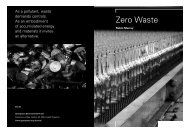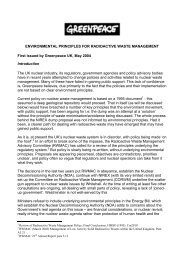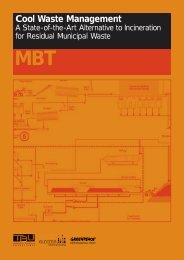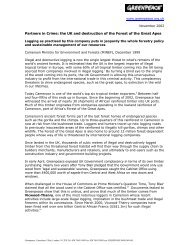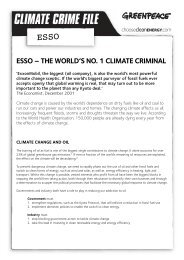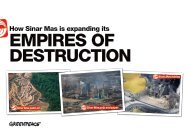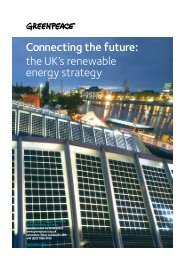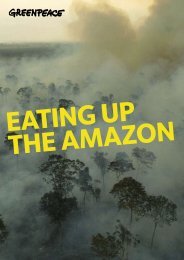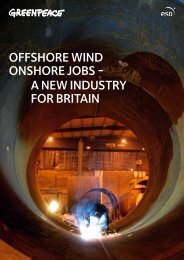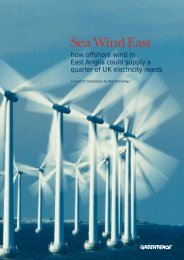[2007] EWHC 311 - Greenpeace UK
[2007] EWHC 311 - Greenpeace UK
[2007] EWHC 311 - Greenpeace UK
Create successful ePaper yourself
Turn your PDF publications into a flip-book with our unique Google optimized e-Paper software.
MR JUSTICE SULLIVAN:<br />
Introduction<br />
1. In this application for judicial review the claimant applies for a quashing order in respect of<br />
the defendant's decision, announced in "The Energy Challenge Energy Review Report<br />
2006" to support nuclear new build as part of the United Kingdom's future electricity<br />
generating mix. The quashing order is sought on the ground that the consultation process<br />
leading to the decision was procedurally flawed and that therefore the decision was<br />
unlawful.<br />
The evolution of energy policy<br />
2. There are very many, often very lengthy, documents and what follows is, necessarily, the<br />
briefest summary. The story begins in June 2001 when the Prime Minister asked the<br />
Performance and Innovation Unit ("the PIU") at No. 10 Downing Street to review the<br />
strategic issues surrounding energy policy and to report to the Government. In February<br />
2002 the PIU published "The Energy Review". Nuclear power was considered in some<br />
detail (see paragraphs 6.46-6.55 and 7.70-7.82). Under the sub-heading "Measures are<br />
needed to keep the nuclear option open ..." the Executive Summary to the document said:<br />
"Nuclear power offers a zero carbon source of electricity on a scale, which, for<br />
each plant, is larger than that of any other option. If existing approaches both<br />
to low carbon electricity generation and energy security prove difficult to<br />
pursue cheaply, then the case for using nuclear would be strengthened.<br />
Nuclear power seems likely to remain more expensive than fossil fuelled<br />
generation, though current development work could produce a new<br />
generation of reactors in 15-20 years that are more competitive than those<br />
available today. Because nuclear is a mature technology within a well<br />
established global industry, there is no current case for further government<br />
support. ...<br />
The main focus of public concern about nuclear power is on the unsolved<br />
problem of long-term nuclear waste disposal, coupled about perceptions<br />
about the vulnerability of nuclear power plants to accidents and attack. Any<br />
move by government to advance the use of nuclear power as a means of<br />
providing a low carbon and indigenous source of electricity would need to<br />
carry widespread public acceptance, which would be more likely if progress<br />
could be made in dealing with the problem of waste."<br />
3. In May 2002 the Government published "Energy Policy — Key Issues for Consultation"<br />
("the 2002 Consultation Document"). Section Two of the 2002 Consultation Document<br />
identified the "Main themes for consultation":<br />
"2.1 We would welcome views and comments on any or all of the<br />
following questions. These to a large extent derive from the<br />
PIU report and the policy objectives it describes. Links to the<br />
relevant sections of the PIU report and other documents are<br />
provided at the end of each section. In submitting views,


![[2007] EWHC 311 - Greenpeace UK](https://img.yumpu.com/22079793/3/500x640/2007-ewhc-311-greenpeace-uk.jpg)
